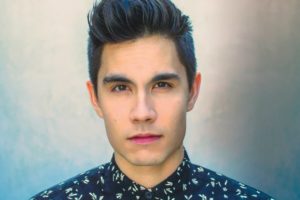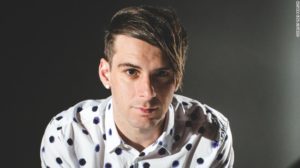News
Celebrities Coming Out in the Internet Age
The experience of coming out as gay to fans can be very different depending on who those fans are.
 Sam Tsui
Sam Tsui
 Trey Pearson
Trey Pearson
Two celebrity musicians–a Christian rocker and a YouTube phenom–recently acknowledged their homosexuality publicly. The musicians create very different kinds of music that appeal to quite distinct audiences. Those differences, in addition to their radically different personal experiences, helped shape the contrasting ways they outed themselves. Whereas one had to come out to a deeply homophobic audience, the other had the luxury of being able to assume that his fan-base would be mostly supportive.
Christian rocker Trey Pearson came out last week via an interview with (614) Magazine, followed by a series of tweets and Facebook posts. His coming out story–“a sad narrative of struggle and shame and denial”–is reminiscent of an earlier era, though one that remains all too common among certain demographics even now.
Pearson, who is 35 years old, is the lead singer of the Christian rock band Everyday Sunday. His song “Wake Up! Wake Up!” was the most-played Christian rock song of 2007, and he has sold around 250,000 albums. He is not a household name nationally, but is well-known within the insular world of Christian rock.
Pearson is not the first Christian rock star to come out. As Jonathan Merritt, who interviewed Pearson soon after his announcement, pointed out in Religious News Service, Pearson is now “in the center of a growing movement of popular Christian musicians who are coming out as gay and are advocating for a more open and accepting posture in the church.”
However, Merritt observes, these pioneers have paid a heavy price for their openness: “Since Christian music fans tend to be conservative and believe that homosexual acts are sinful, you won’t hear these artists’ music played in most churches or on Christian radio these days.”
Pearson’s knowledge that the revelation of his homosexuality will likely end his career not only makes his decision to come out a brave one, and a measure of the misery he faced living in the closet, but it also no doubt shaped the terms of his coming out story.
For example, the letter he posted on Facebook, informing his fans of his homosexuality is less an affirmation of his sexuality than it is a confession that he has been unable to live according to the dictates of his religion. It is more apologetic than celebratory.
“I never wanted to be gay,” he tells his fans, and adds: “I was scared of what God would think and what all of these people I loved would think about me; so it was never was an option for me. I have been suppressing these attractions and feelings since adolescence. I’ve tried my whole life to be straight. I married a girl, and I even have two beautiful little kids.”
After struggling against his attractions toward men and desperately attempting to develop heterosexual feelings, Pearson finally reached the conclusion that he has irrevocably failed in his quest. “I am never going to be able to change how I am . . . [or] what I know deep down: that I am gay.”
Despite casting his acquiescence in the reality that he is gay as an epic failure, Pearson nevertheless acknowledges that his honesty–”his escape from the prison of the closet”–has brought him peace.
“I know I have a long way to go,” Pearson writes. “But if this honesty with myself about who I am, and who I was made by God to be, doesn’t constitute the peace that passes all understanding, then I don’t know what does. It is like this weight I have been carrying my whole life has been lifted from me, and I have never felt such freedom.”
He ends his letter with a plaintive appeal to his fans not to reject him. “I hope people will hear my heart, and that I will still be loved. I’m still the same guy, with the same heart, who wants to love God and love people with everything I have. This is a part of me I have come to be able to accept, and now it is a part of me that you know as well.”
Pearson subsequently appeared on ABC’s The View to explain his experience and his need to come out.
The other musician who recently came out is YouTube star Sam Tsui, who is most famous for his covers of popular music. On April 15, Tsui came out in a vlog posted on his YouTube channel, and used the occasion to announce his imminent wedding to fellow musician and collaborator Casey Breves, which occurred the following day.
Tsui, who is 27, came to prominence while an undergraduate at Yale, where he majored in ancient Greek. The videos he made with his friend from boyhood, Kurt Hugo Schneider, took YouTube by storm, some of them garnering more than 30,000,000 views each and well over 500,000,000 in total. The YouTube covers also launched Tsui on a live performance career, as well as creating an audience for his original singles and albums.
While Tsui’s sexuality had been the subject of some speculation, he had not come out publicly until the April 15 vlog despite an unusual level of engagement with his YouTube subscribers, who are known collectively as “The Samily.” In the vlog, he addresses the possibility that some of his fans might find his previous reticence about his personal life dishonest or evasive, claiming that he initially thought his relationships were not relevant to his music.
He pointedly denies that his reticence stemmed from any shame or ambivalence about his homosexuality or his relationship with Breves: “Given this is a coming out video of a sort, I want to say very clearly that waiting to tell you guys about this does not mean I am or was ashamed about anything. I am proud of who I am and very proud of my relationship with Casey, because he is amazing.”
He adds, “I never felt the need to do a big tear-y coming out video because honestly, in my daily life it’s such a non-issue.”
The vlog does betray anxiety that some members of the “samily” might be offended by the news that Tsui is gay, perhaps because a considerable number of his fans are teenage girls who may indulge romantic fantasies about him. But clearly Tsui does not have to worry about the kind of wholesale rejection by his fans that Pearson must fear.
Indeed, Tsui says, “I really do hope and trust that this new information or my sexuality doesn’t change your opinion of me or my music. I assume we are all 2016-enough to know that it shouldn’t.”
The wedding between Tsui and Breves, which was announced in the vlog, was also the subject of an extraordinary gay wedding video, featuring their song “This Promise,” which may be found here.
The contrast between the two coming out modes is apparent. One is tortured and dramatic, the other is confident and casual. Whereas Pearson feels the need to explain in great detail the painful struggle that led him to decide that he could no longer live in the closet, Tsui simply declares that he is about to marry his boyfriend, whom he has dated for some time. He feels no need to explain or justify his sexuality, though he is self-conscious about the fact that he has not previously revealed the information to his fans.
Tsui’s casual coming out is similar to that of other closeted celebrities who have come out by simply stating a fact about themselves. These are usually people who have long been out in their private lives, including among professional colleagues, but have not taken the final step of announcing their sexuality publicly.
Good Morning America host Robin Roberts, for example, came out on December 29, 2013 in a year-end Facebook message in which she casually included her longtime partner Amber Laign among those who helped her through a trying year during which she recovered from chemotherapy and a blood marrow transplant. In her first public acknowledgment of her ten-year relationship with Laign, Roberts expressed gratitude to all who supported her in her battle against MDS, the blood disorder that threatened her life.
Similarly, weatherman Sam Champion and longtime partner photographer Rubem Robierb outed themselves in a 2012 New York Times article by Jacob Bernstein about the wedding of MSNBC News anchor Thomas Roberts and Patrick Abner. Bernstein noted the presence of the two at the Roberts-Patrick reception. Caught up in the spirit of the moment, Champion told the reporter, “We’re getting married New Year’s Eve in Miami.” Robierb corrected him: “We’ll do it here officially, and then have a party in Miami.” Champion, who had been widely rumored to be gay and who frequently attended gay events in New York, seemed eager to seize an opportunity to come out publicly without having to make a “big tear-y coming out video.”
If Tsui’s coming out vlog partakes of the matter-of-factness of the announcements of Robin Roberts and Sam Champion, Pearson’s public coming out is reminiscent of an earlier era when homosexuality was widely stigmatized and most celebrities who came out were typically outed by others.
However, Pearson’s story does bear a resemblance to that of country singer Ty Herndon, who in November 2014, at the age of 52, confirmed long-standing rumors about his sexuality, telling Entertainment Tonight reporter Sophie Schillaci that “I have an awesome relationship that I’ve been in for a good number of years. [I] love him very much and he loves me.”
 Ty Herndon
Ty Herndon
Herndon, who produced his biggest hits in the 1990s, including “What Mattered Most” (1995), “Living in a Moment” (1996), and “It Must Be Love” (1998), revealed that he had convinced himself that he could not be gay and have a career in country music. Hence, although he knew that he was gay when he was ten years old, and told close family members when he was 20, he went to great lengths to pass as straight so that he could be a country music singer.
Married to women twice before coming to terms with his sexuality, Herndon told ET, “I have made a lot of mistakes in my life. They’ve been my mistakes, and I own them.” He added, “I’ve done a lot of work around forgiveness with people that I’ve hurt and people I’ve not been honest with because of my sexuality.”
He said that recent indications that country music has become more supportive of the lgbt community encouraged him. “Traditionally in country music, we don’t see a lot of support . . . , but that’s changing so much.” As evidence, he cited the fact that “Kacey Musgraves won [CMA] Song of the Year for ‘Follow Your Arrow, Wherever It Points,’ and two amazing songwriters that happened to be gay wrote that song.”
Pearson’s public coming out is also reminiscent of the 2014 coming out of Australian swimmer Ian Thorpe, which also involved a long history of struggle and denial.
 Ian Thorpe
Ian Thorpe
Thorpe, one of the greatest swimmers in history, and an icon of Australian sport, came out in a highly touted interview on Australian television. After years of adamantly denying rumors that he was gay, in the interview he discussed the pain he experienced in coming to terms with his sexuality while also battling depression.
He explained that he had been trapped by his evasion and deception. “What happened was I felt the lie had become so big that I didn’t want people to question my integrity. . . . I didn’t want people to question that . . . have I lied about everything?”
He added, “I’ve wanted to [come out] for some time. I didn’t feel I could. Part of me didn’t know if Australia wanted its champion to be gay.”
Thorpe’s questioning of whether Australia would accept a gay sports hero is equivalent to Pearson’s worry as to whether Christian rock fans can accept a gay Christian rocker.
Just as Pearson expresses hope that the revelation of his suffering in the closet might lead to a kinder and more accepting posture by Evangelical Christians, so Thorpe expressed the hope that his coming out might help others. Having reached a point where “I’m comfortable saying I’m a gay man,” Thorpe wants young people to realize “You can grow up, you can be comfortable and you can be gay.”
An outpouring of support for Thorpe indicated that Australia was ready to accept a gay sports hero. Whether there will be a similar flood of support from Evangelical Christians for Pearson is, alas, doubtful.
Images of Trey Pearson and Sam Tsui via Twitter
Enjoy this piece?
… then let us make a small request. The New Civil Rights Movement depends on readers like you to meet our ongoing expenses and continue producing quality progressive journalism. Three Silicon Valley giants consume 70 percent of all online advertising dollars, so we need your help to continue doing what we do.
NCRM is independent. You won’t find mainstream media bias here. From unflinching coverage of religious extremism, to spotlighting efforts to roll back our rights, NCRM continues to speak truth to power. America needs independent voices like NCRM to be sure no one is forgotten.
Every reader contribution, whatever the amount, makes a tremendous difference. Help ensure NCRM remains independent long into the future. Support progressive journalism with a one-time contribution to NCRM, or click here to become a subscriber. Thank you. Click here to donate by check.
 |























